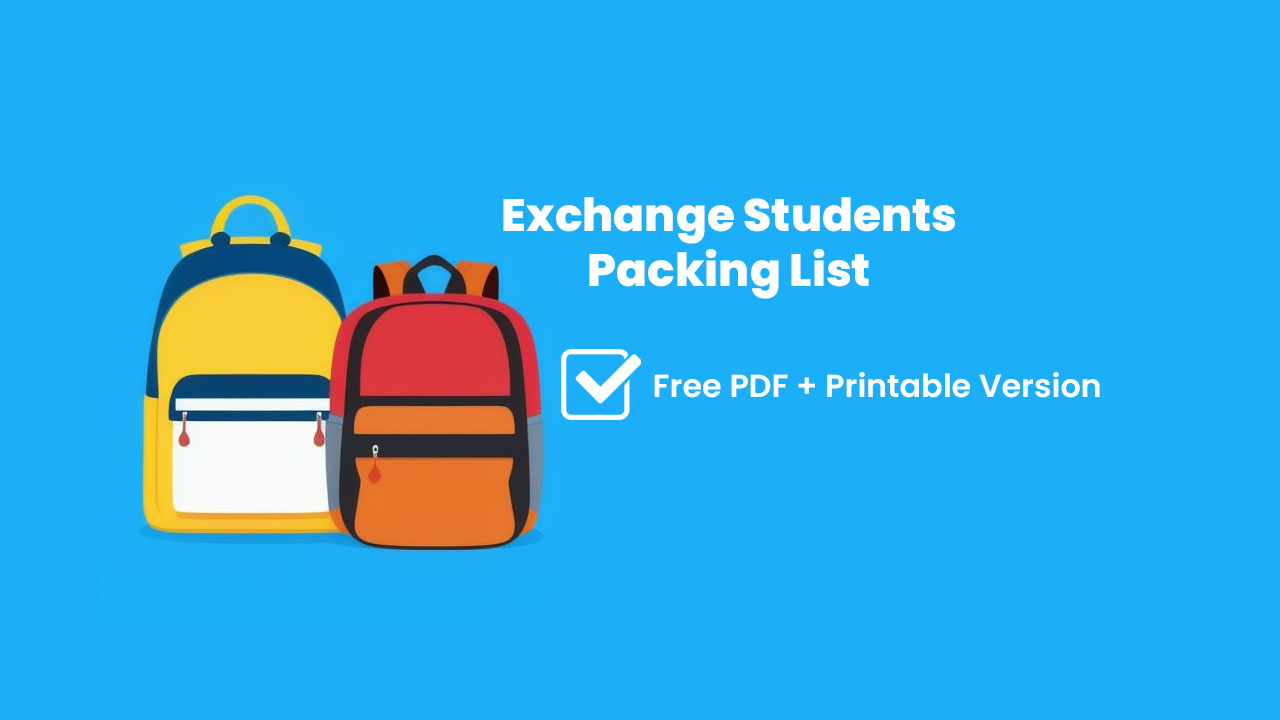Packing List for Exchange Students

Do you participate in a student exchange program like Global UGRAD, or Erasmus?
It doesn’t matter if you’re going for a whole semester, a year, or just a few weeks. It also doesn’t matter if you’re going abroad or staying in the country.
In this guide, you’ll find the list of essential items you should bring with you. We’ll also share some tips regarding packing as an exchange student.
Let’s dive into it.
Travel Checklist for Exchange Students
Documents
Money
First Aid Kit
Clothes and Shoes
Toiletries
Electronics
School
General Stuff
Print or get the PDF
If you need an even more detailed list, check also our ultimate travel checklist.
What you shouldn’t pack
You may want to extend our list and add a few more things that are important to you (e.g., your favorite tea or a teddy bear).
It’s okay, but here are a few things we don’t think are worth packing as an exchange student:
- Books: This might be counter-intuitive, but we talk about books that aren’t necessary for school purposes. Avoid bringing a vast collection of physical books. E-books or access to a local library or university library may be more practical. If you don’t have an E-book reader, consider a simple app you can download on your phone.
- Non-Essential Kitchen and Toiletry Items: They take up a lot of space, but they are probably already there.
- Full-Sized Towels and Bedding: Check with your accommodation to see if they provide towels and bedding. If they do, there’s no need to bring your own, which can take up valuable space.
- Heavy Winter Gear: If you’re studying in a warm climate or during the summer, there’s no need to pack heavy winter coats, boots, and accessories.
- Excessive Clothing: Avoid bringing your entire wardrobe. Pack clothing suitable for the local climate and the duration of your stay.
- Valuable Jewelry: Leave expensive or sentimental jewelry at home to reduce the risk of loss or theft.
- Too Many Shoes: Limit the number of shoes you pack. A few versatile pairs for different occasions should be enough
- Prohibited or Restricted Items: Be aware of any items that may be prohibited or restricted by your host country’s customs regulations, and avoid packing them.
Packing Tips for Exchange Students
Here are our 10 tips:
- Research Your Destination: Understand the local climate, culture, and lifestyle of your host country. This knowledge will guide your packing choices.
- Pack Travel-Sized Toiletries: Opt for travel-sized toiletries to save space, and refill them as needed.
- Check Voltage and Plug Adapters: Ensure your electronic devices are compatible with the local voltage and bring the necessary plug adapters.
- Pack Essentials in Your Carry-On: Important documents, medications, and valuable items should be in your carry-on bag in case your checked baggage is delayed or lost.
- Check Baggage Allowance: Be aware of your airline’s baggage allowance and any fees for exceeding weight limits.
- Leave Room for Souvenirs: If you anticipate buying souvenirs during your exchange, leave some space in your baggage or consider shipping items home.
- Label Your Baggage: Label your baggage with your contact information to help identify it if it’s lost.
- Secure Valuables: Keep valuable items, such as electronics and passports, secure and locked when not in use. For example, you can consider buying an anti-theft backpack.
- Learn Packing Hacks: Explore additional packing hacks and techniques, such as using plastic bags for toiletries or stuffing socks inside shoes to save space.
- Learn about layering: When it comes to your outfits, consider the layering approach, which allows you to adapt to changing weather conditions without packing bulky items.
Frequently Asked Questions
Why do I need this packing list?
It’s easy to forget something important. This packing list is designed to help you prepare for your exchange program by ensuring you have all the essential items you’ll need during your stay abroad.
Is this list suitable for all exchange programs and destinations?
While this list covers most essentials, it’s a general guide. You may need to customize it based on your specific destination, program, and personal preferences.
How should I use this list?
You can use this list to check if you’ve packed all the necessary items, or you can print it and add your own list of fields, fill it in with your additional essentials, and pack based on it.